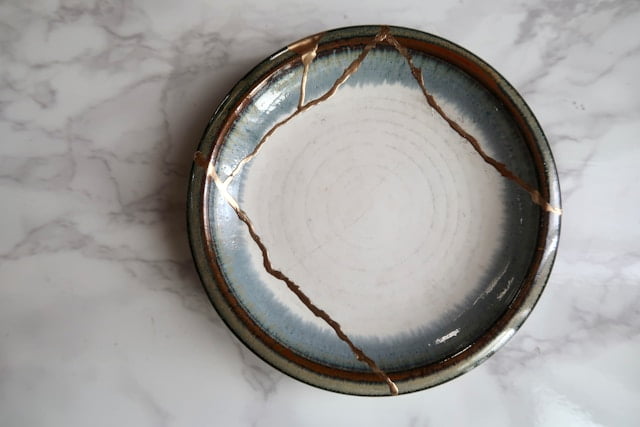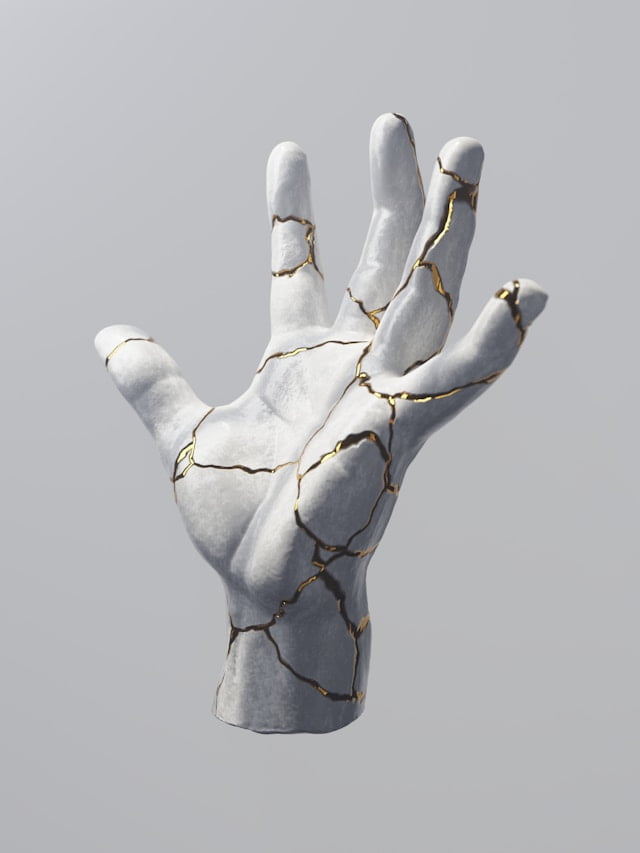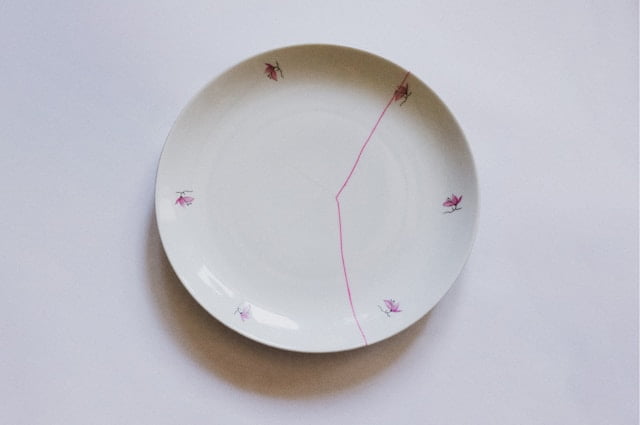Benefits of Wabi Sabi and Kintsugi for Mental Health
The world is currently going through a significant mental health crisis, and sadly the UK is no exception.
Whether it is the result of workplace stress, financial insecurity, social pressures or addiction problems, poor mental health is something that can cause significant issues in a person’s life and should be addressed with the appropriate seriousness.
Many different approaches to mental health treatment exist, from conventional psychotherapy, specialised medicines and mental health counselling to a wide range of apps, lifestyle tips and alternative treatments.
One such method is the practice of Kintsugi, a Japanese style of creatively repairing broken objects that has strong meditative potential and links to the philosophical framework of Wabi Sabi.
These practices have been shown to have a significant positive impact on the mental health [1] of those who practice them, and today we will explore how and why.
What is Kintsugi?

Bowl that has been repaired through Kintsugi
Kintsugi, or ‘Joining With Gold’, is a Japanese practice of repairing broken pottery and other items using gold or gold-coloured paints.
It involves gathering as many pieces of the broken item as possible, reassembling them using appropriate materials (i.e pottery glue) in their original design and then covering the exposed repaired sections with golden paint, gold leaf or even gold plating.
Extremely skilled Kintsugi practitioners can even use molten gold to repair certain items.
The resulting object can be observed as a piece of art and is often considered more beautiful than before it was broken, as the object itself is now telling a story
This practice highlights the history of the object, focusing on the transient nature of material things and displaying the past of a thing instead of attempting to hide it or discard it.
Japanese cultural history attributes the creation of Kintsugi – or at least widespread adoption – to the 16th century and particularly to the Shogun Ashikaga Yoshimasa, [2] who wanted a more aesthetic way of repairing objects than the large metal staples used more widely at the time.
Over the centuries this practice was cemented in Japanese society and then gradually spread out across the rest of the world.
The process of making something more beautiful by repairing it became linked with Zen Buddhist beliefs, specifically the concept of Wabi Sabi, which values beauty in imperfection and cultivates an appreciation for the passage of time.
Many people enjoy the look of objects repaired by Kintsugi, but its usefulness goes far deeper than this.
Many people find the practice itself to be engaging and relaxing. The meditative elements of Kintsugi have even been shown to be effective at treating conditions like PTSD and general distress. [3]
How Does Kintsugi Relate to Wabi Sabi?

Marble hand repaired through Kintsugi
Wabi Sabi is an artistic and aesthetic movement concept that values the imperfect, [4] considering flaws and incompleteness to be a sign of the temporary nature of all things and choosing to see the beauty in that.
‘Wabi’ can be defined as finding the beauty in simple, natural things in life, whilst ‘Sabi’ is an awareness of how time impacts people, the world and material objects.
Wabi Sabi is a movement often associated with nature and an awareness of one’s place in the wider natural world.
Kintsugi is a clear material representation of this philosophy, rejecting the illusion of unbreakable wholeness to instead embrace an object’s history as something that can and has been broken, and yet was repaired.
This technique exemplifies one of the key philosophical values of Wabi Sabi – that change is a constant and even the most destructive of setbacks is not a permanent state of being.
How Do Kintsugi and Wabi Sabi Support Good Mental Health?

Mental health worker and patient discussing how Kintsugi and Wabi Sabi support mental health
An explicit acknowledgement of imperfection can be extremely helpful in an overwhelming perfectionist world.
At a time when celebrity culture and social media place an extremely heavy emphasis on the appearance of perfection, seeing one’s own shortcomings can often be a key part of mental health struggles.
The focus on flaws and breakages reminds us that setbacks are not permanent, that struggling with things is entirely normal and that even catastrophic damage can be overcome.
Challenging the idea of things being timeless and perfect also allows for a healthier mental state, encouraging us to accept ourselves as we are, even with our flaws.
-This awareness promotes mindfulness and a calm, meditative state of mind in relation to mental health conditions.
This can be especially useful in addiction recovery when a person feels low, when their struggle seems overwhelming and when they have experienced a relapse.
Kintsugi encourages a person to engage in the six R’s:
- Relating
- Resourcing
- Repatterning
- Reprocessing
- Reflecting
- Ritual
Each of these concepts is a cornerstone of improving mental health and the overall process has been linked with positive mental health outcomes in the field of neuropsychotherapy. [4]
As previously mentioned these practices have been proven to be effective in treating PTSD, although they are also beneficial for conditions like anxiety and depression.
What Other Ways of Practicing Wabi Sabi Are There?

Mental health worker and patient discussing how Kintsugi and Wabi Sabi support mental health
Kintsugi is an extremely effective way of practising Wabi Sabi, but it isn’t the only way.
There are many things you can do to help integrate the core principles of Wabi Sabi into your everyday life.
Mindfulness practices
Being aware of your body, your feelings and your surroundings is an excellent way to ground yourself in the present moment.
This awareness is a key part of appreciating the present moment and the world around you, which is exactly what Wabi Sabi is about.
Something as simple as breathing exercises every morning or taking a few spare minutes to appreciate the taste or sensation of an everyday thing is an excellent way to calm the mind and help you be more in touch with your mental health.
Self-reflection and your personal story
Wabi Sabi places a very distinct emphasis on the personal stories of people and objects, encouraging us to examine our past experiences and how those have shaped us into the people we are today. Self-reflection is a key part of understanding your own story.
Practices like journalling or keeping a log of your thoughts help to remind you of your history, how you have faced challenges and overcome them, and allow you to better navigate your thoughts and feelings.

Mental health support group discussing Kintsugi and Wabi Sabi
Appreciating simplicity
At the core of Wabi Sabi is an appreciation of the simple things in life.
Everyday objects, natural surroundings, small interactions with others – these are the familiar things that Wabi Sabi encourages us to appreciate to their fullest.
When we have a greater awareness of these more humble things and how they can bring us joy, we are better prepared to see past the perfectionism and ostentation that is not often the root cause of self-doubt, a lack of confidence and poor mental health.
Learning from setbacks
Everyone makes mistakes. This is something at the very core of Wabi Sabi, and understanding those mistakes and moving past them is how this philosophy encourages personal growth.
Just like a piece of pottery repaired through the Kintsugi, we can examine our own shortcomings with a clear mind and rebuild our confidence piece by piece, never forgetting those moments but understanding what caused them and making ourselves stronger in the future.
How Can I Access Kintsugi and Wabi Sabi for My Mental Health?

Two friends talking about how to start practicing Kintsugi and Wabi Sabi for mental health
Kintsugi and Wabi Sabi may seem like extremely effective ways of building up your mental health, but how do you access them?
Thankfully these practices are both approachable and easy to access.
Although they were once limited to Japanese culture, these days you can find resources for Kintsugi no matter where you live.
The following detail some of the most common ways in which people take part in Kintsugi:
Local courses
Possibly the most popular way to begin practising Kintsugi and Wabi Sabi is through a local course.
Similar to a social club or hobby group, local Kintsugi courses are typically organised in community spaces and run by experts who will be able to guide first-time Kintsugi practitioners through the finer points of the process, all within a welcoming and social environment.
NHS support
If you’re not convinced about the effectiveness of Kintsugi, one major legitimising factor is the fact that it is offered by several NHS services for mental health. [6]
This presentation not only helps to bring more awareness and respect for the practice of Kintsugi in the UK, but it also helps to show how the NHS maintains a wide perspective on providing mental health support, providing access to less conventional methods despite significant financial cutbacks.

Two people sat at a laptop discussing how to access Kintsugi and Wabi Sabi practice groups
Online groups and hobby spaces
One of the advantages of the increasing ubiquity of communication technology in society is that specialist interest groups that were previously difficult to find can now be accessed by anyone and everyone.
Many different online Kintsugi groups exist, some of which are run by rehab services or wellbeing specialists, whilst others are run by enthusiasts.
Whether you’re looking for guidance about how to start practising Kintsugi, or if you’re just looking for a positive social group to share a passion with, online groups can be a great help.
Personal practice
The easiest way to practice Kintsugi and Wabi Sabi is to do it in your own time and space.
Whilst many people prefer the support and advice of a group, it is entirely possible to engage in this practice by yourself.
Various online guides [7] exist to provide guidance to those trying Kintsugi for the first time.
Final Thoughts on the Benefits of Wabi Sabi and Kintsugi for Mental Health

Friends holding hands and talking about the benefits of Kintsugi and Wabi Sabi for mental health
Whatever mental health struggles you may be facing, whether it’s anxiety, depression, bipolar disorder, schizophrenia, PTSD, some kind of substance or behavioural addiction or anything else, improving your general mental well-being can be a fantastic help.
Kintsugi and the philosophy of Wabi Sabi are both excellent sources of mental health support, helping to introduce relaxing and meditative practices that can help to improve mood and patterns of cognitive behaviour in order to steer a person away from the worst elements of poor mental health.
When a person practices Kintsugi, they are able to create a physical reminder of the positive philosophical aspects of Wabi Sabi with their own hands, giving them a physical anchor to turn to in times of stress.
Although many mental health issues will not be cured by these practices, and with consideration towards the fact that any formal mental health counselling and medication courses recommended by a professional should always be taken seriously, Kintsugi and Wabi Sabi can nevertheless provide an essential part of a person’s mental health treatment plan.
To learn more about mental health support available in your area, give our expert team a call for free on 0800 088 66 86
References for Benefits of Wabi Sabi and Kintsugi for Mental Health
[1] https://slam.nhs.uk/kintsugi-course-a-creative-experience-of-healing-and-restoration
[2] https://www.japanhouselondon.uk/read-and-watch/kintsugi/
[3] https://www.ncbi.nlm.nih.gov/pmc/articles/PMC9007128/
[5] https://slam.nhs.uk/kintsugi-course-a-creative-experience-of-healing-and-restoration
[6] https://drarielleschwartz.com/neuropsychotherapy-and-trauma-treatment-dr-arielle-schwartz/
[7] https://kintsugi-kit.com/pages/3-steps-to-start-kintsugi-at-home




